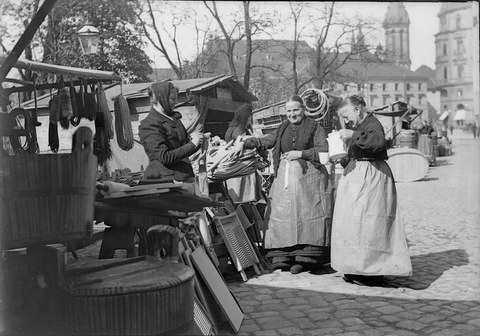Chair of Social and Economic History
View of the Leipzig market at Töpferplatz.
Photographer: Adolf Deininger, around 1900. (Source: Stadtgeschichtliches Museum Leipzig, Fotothek)
Social and Economic history at TU Dresden
Economic and social history primarily focuses on economic and social developments, on the economic and social composition of societies, on the economic and social conceptions, ideas and theories involved, and on people's actual economic and social activities - in this sense, it appears to be a clearly defined sub-discipline of the science of history. It is a so-called systematic discipline whose object of knowledge is not linked to any particular period. Although the term economic and social history suggests that it is a special discipline that analyses both economic and social developments as well as their interrelation, in practice this is rarely the case. At the currently existing chairs in Germany, research is dominated mainly by economic history. Their most common shared topics are the history of industrialisation, the history of companies and/or the history of globalisation.
The fundamental question of economic history is the material survival of mankind, or the material foundations of a society in the course of historical change. The areas of work include the history of companies and entrepreneurs, of crises and business cycles, the history of individual branches and industries as well as their institutions, such as commerce, banks, crafts, industry and agriculture, the history of economic systems, of economic ideas, theories and economic thinking in general, of economic policy, public finances, tax burdens, and sometimes the history of technology as well.
The Chair of Social and Economic History at TU Dresden presents a view of economic history that is interested in the respective specific normative ideas of correct and good economic activity, the associated institutions, and the concrete practices of the actors in securing material production, distribution, and consumption.
Social history originated in contrast to traditional general historiography, which understands history primarily as the history of great men, important powers and their relationships, or as the history of ideas. Social history thus focuses on the history of the many, and on the way societies or communities function throughout time. Social history is characterised by great inner diversity. Its areas of work encompass the history of social statuses, classes and strata, of companies and associations, of social relations of all kinds, the history of work and of working conditions in their transformation, the history of mobility and migration, of sexuality, family, everyday life, leisure time, and finally the history of social inequality of various types - between and within classes and strata, between and within sexes, generations, ethnic groups, as well as people of different religious or denominational affiliations. Social history may have different focal areas, such as a close combination with economic history, a more political social history, or a closer connection with cultural or gender history. At the Chair of Social and Economic Historyat TU Dresden, social history is addressed primarily as a history of social inequality and of social ideas and movements.
With a view to both subjects, we aim to profile the Dresden Chair of Social and Economic History in such a way that it explicitly combines economic and social history with aspects of women's and gender history. The specific feature of the category of gender will distinguish the Dresden Chair of Social and Economic History from the other two chairs in Saxony in Leipzig and Chemnitz. We strive for its specific nature to become visible in German historiography. The Chair aims to analyse the importance of economic factors, social references and cultural conditioning - especially gender - in specific historical constellations. Methodologically, this approach seeks to link structural history, historical anthropology and gender history. In teaching, the objective is both research-oriented and practical education. To this end, we cooperate with various partners at TU Dresden as well as with archives and museums within the framework of DRESDEN-concept and beyond.
Susanne Schötz

